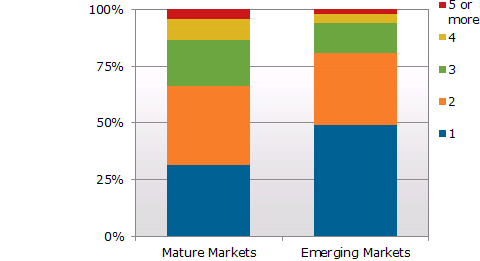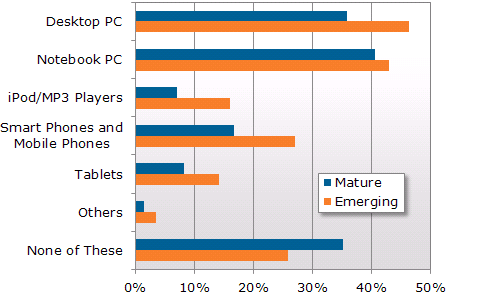Consumers in Emerging Markets, Such as China and Brazil, Will Drive TV Demand
Tuesday, July 24th, 2012
More than 40% of consumers in emerging markets intend to purchase a new TV in next 12 months
SANTA CLARA, Calif. — According to the recently released NPD DisplaySearch Global TV Replacement Study, consumers in emerging markets–such as Russia, Turkey, China, India, Indonesia, Brazil, and Mexico–are going to drive the next round of demand, with more than 40% planning to purchase a TV in the next 12 months. Declining prices, increased brand promotions, and an on-going replacement cycle are the main reasons for increasing demand in these countries.
Drivers for planned purchases differed for emerging markets versus mature markets, such as the United States, Japan, Germany, France, Italy and the UK.
“The desire to have a flat panel TV, good picture quality, and more affordable prices are cited as the top three reasons for planned purchases in mature markets,” noted Riddhi Patel, Research Director, Consumer Insights for NPD DisplaySearch. “For emerging markets, the primary reasons driving planned purchases are picture quality, sound quality, and a strong warranty/service plan. These results show the influence of financial status and living standards in consumer mindset when it comes to TV purchases.”
The technology mix of existing TVs in households is strikingly different between the emerging and mature markets. This may be due to lower spending power in emerging markets. The emerging market technology mix is dominated by CRTs (53%), but LCD TVs dominate in mature markets where 54% of TVs are LCD. Plasma has a small presence of 7% in mature and 6% in emerging markets, and rear projection makes up for a negligible portion of the existing installed-TV base.
The report also found that households in mature markets own an average of 2.4 TVs each, and in emerging markets, the average is 1.8 TVs per household. More than two-thirds of households in mature markets have more than one TV set, but nearly half of the households in emerging markets have only one TV. Like mature markets, consumers in emerging markets are increasingly replacing their existing legacy sets with flat panels (mainly LCD TVs) because of increased availability and consumer desire for better quality, larger screen, high definition TV sets.
Figure 1: Average TVs per Household in 2012

Source: NPD DisplaySearch Global TV Replacement Study
More TV/Video Content Consumed on Other Devices in Emerging Markets
The NPD DisplaySearch Global TV Replacement Study also surveyed households about the additional devices used to view TV/video content, finding that more households in emerging markets use devices other than a TV, including mobile devices such as tablets, smart phones, and MP3 players.
“Because many households in emerging markets have only one TV but multiple generations living under one roof, mobile device penetration in these markets is high, which enables consumers to access content in other ways,” added Patel.
Figure 2: 2012 Usage of Additional Devices for Viewing TV/Video Content

Source: NPD DisplaySearch Global TV Replacement Study
The NPD DisplaySearch Global TV Replacement Study offers a focused view of TV replacement trends in 14 global markets. This study also provides insight into the reasons why consumers are replacing their CRT and flat panel TVs. This unique global study provides clients with country-level insights and information based on nationally representative samples of more than 14,000 TV owners. The study combines NPD DisplaySearch TV analyst expertise with the advanced consumer survey design of its parent company, The NPD Group. For more information on the NPD DisplaySearch Global TV Replacement Study, contact Charles Camaroto at 1.888.436.7673, e-mail contact@displaysearch.com, or contact your regional NPD DisplaySearch office in China, Japan, Korea, or Taiwan for more information.
Latest News
- Plex has largest FAST line-up with 1,112 channels
- TV3 migrates from on-prem servers to AWS Cloud with Redge
- Virgin Media partners with PubMatic to scale FAST advertising
- Interactive TV news channel unveiled by ROXi and Sinclair
- Spideo and OTTera unveil personalisation collaboration at NAB Show 2024
- Amagi integrates Intertrust DRM for FAST services